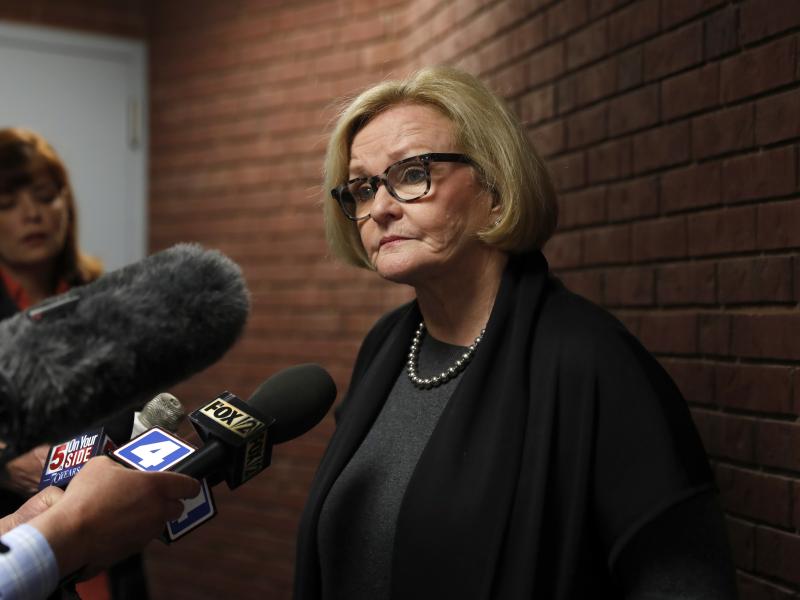
When the party in power loses Senate (and/or House) seats in a mid-term election, it is generally because the President isn’t very popular. More accurately – barring a scandal or an economic downturn – it’s because that President has put forth, and Congress has approved, a policy that proves unpopular. It’s hard to think of an example of the party in power losing congressional seats because the President is waging an all-out political war on his own party as Donald Trump has done.
In 2006, Republicans lost six seats and their majority in the U.S. Senate largely because voters were unhappy about the war in Iraq, and as a result, were unhappy with GOP President George W. Bush. In 2010, Democrats lost six seats but hung onto their majority by a thread because many voters didn’t like the newly approved Affordable Healthcare Act, and thus fewer approved of the job that Democrat Barack Obama was doing as President. Some would argue that losing seats in a mid-term election is simply the price a party pays for acting on its policy priorities.
Then there is Donald Trump, who in just over seven months has added a whole new dimension to the body of evidence about why the party in power loses seats in a mid-term election. Instead of helping his party hang on to Senate seats, he appears to be doing all he can to help Republicans lose them.
Republicans entered this cycle with two major advantages. First Democrats are defending 25 seats to just nine for Republicans. And second, Trump carried 10 of those Democratic-held seats. At the very least, these two factors were supposed to provide a solid line of defense against losing seats. Trump, though, has done his very best to erode that line.
In fact, Trump’s disregard for the health of the GOP Senate majority started before he was sworn in and has continued unabated. There have been both missed opportunities and outright hostility to incumbents up for re-election. Consider:
- The Cabinet: Despite meetings with Democratic Sens. Heidi Heitkamp of North Dakota and Joe Manchin of West Virginia, Trump didn’t make them offers they couldn’t refuse to entice them into his Cabinet. Republicans would be favored to win both these seats if incumbents other than Heitkamp and Manchin occupied them.
- Montana: Trump knew that At-Large U.S. Rep. Ryan Zinke was gearing up to challenge Democratic U.S. Sen. Jon Tester in 2018 and was Republicans’ strongest recruit. Yet, he appointed Zinke to be Interior Secretary, causing the seat to slide down the GOP’s list of Democratic targets.
- Alabama: Trump ended up endorsing appointed GOP U.S. Sen. Luther Strange a week before the primary via, what else, Twitter. It seemed too little, too late, although the Strange campaign made the most of it. Now Strange is in a run-off with former state Supreme Court Justice Roy Moore, begging the question of whether there would even be a primary if Trump had put an early effort into uniting the party? Strange would be considered the frontrunner against Democrat Doug Jones, but a Moore-Jones contest would be more interesting than a Senate race in Alabama should be.
- Nevada: Trump has called out GOP U.S. Sen. Dean Heller by name on several occasions and particularly on health care reform. The pro-Trump super PAC America First Policies actually started running television ads criticizing Heller until cooler heads prevailed upon the group to pull the spots. Still, if Trump and his allies intended to inflict damage, they succeeded. Danny Tarkanian has announced a primary challenge to Heller and is running as a Trump acolyte. Tarkanian has run for a number of offices over the last decade, and while he hasn’t won a general election, he has won contested GOP primaries.
What Trump misses (or choses to ignore) here is that Democratic presidential nominee Hillary Clinton carried Nevada, and it is a swing state. Heller eked out a win in 2012 by just over 10,000 votes as President Obama was carrying the state by six points. In short, Heller can’t win re-election without independents and some Democratic votes. A far more conservative candidate like Tarkanian would struggle in a general election. - Arizona: GOP U.S. Sen. Jeff Flake has been the target of much of Trump’s vitriol in the past few weeks. It came to a head August 17 when Trump appeared to endorse former state Sen. Kelli Ward via Twitter. Ward ran against U.S. Sen. John McCain in the GOP primary last cycle, taking 40 percent of the vote. This is more a reflection of how conservative the GOP electorate is than it is about Ward’s skills as a candidate. In fact, Ward tends to be politically tone deaf, has ascribed to conspiracy theories, and is a weak fundraiser. But, Trump has given her credibility and with that will come money and support. The state party, which provided no assistance in 2016, is offering assistance this time.
There are other candidates considering challenging Flake for the nomination, notably state Treasurer Jeff DeWit and former state party chair Robert Graham. It would help Flake if one or both got into the primary, but Ward has Trump’s tacit endorsement and it might not be easy to displace Ward at this point. At his rally in Phoenix this week, Trump treated Flake as “He who shall not be named” in an apparent effort to dial back his attacks, but it did little good.
Democrats are likely to have a first-tier candidate, as it appears that U.S. Rep. Kyrsten Sinema intends to run. If Flake wins the primary, it would be an even money race going into the general election. If Ward is the nominee, she might well be an underdog against a well-funded, credible Democrat. - Tennessee: Trump’s attacks on Republican Sen. Bob Corker haven’t gotten nearly the attention that his attacks on Flake and Heller have, but they have conservatives in the state talking about running against him in a primary. Corker is somewhat better positioned than his colleagues, and an open gubernatorial contest will guarantee voter turnout, but the race could get competitive if it becomes a referendum on Trump.
There are those who are dismissive of primaries, arguing that the incumbent usually wins and thus it doesn’t really matter. It does matter because in the era that dawned with tea party challenges to incumbents, there have been losses (see: Bennett, Robert and Lugar, Richard). As important, primaries suck up time and resources that Republicans would rather spend against Democrats. Finally, the nominee ends up walking into the general election with scar tissue that Democrats can easily exploit.
The real question – as it is with so many things in Trump’s world – is what the President believes he is achieving by attacking his own party’s Senate incumbents? There are many possibilities that range from his general lack of self-discipline to his lack of understanding about political campaigns and his role as the titular leader of the Republican Party. Of course, it may well be that Trump lacks the capacity to see the bigger picture of the 2018 political landscape in a way that isn’t all about him. The answer is almost irrelevant because the damage has been done. And, that’s before Trump’s support for shutting down the government if he doesn’t get funding to construct his border wall becomes a factor.
If there is a silver lining for Republicans, it’s that it is hard to see how Democrats pick up the three seats they need to win the majority. Even if they hold all 25 of their own seats, which is hardly a foregone conclusion, and they win both Arizona and Nevada, where does the third seat come from? Alabama? Maybe, but it’s a big reach today? Texas? There isn’t much evidence that Democratic U.S. Rep. Beto O’Rourke is a serious to Republican U.S. Sen. Ted Cruz, at least not yet. A sleeper so obscure that it’s unfathomable at the moment or a scandal that has yet to break? Neither seems within the realm of possibility today.
Still, if the 52-seat majority frustrates Trump, a 51-seat majority or a tied Senate would be a lot less palatable. A Democratic majority would render Trump ineffective for the remainder of his term.
And what about Senate Democrats? They are quietly cheering him on because everything Trump has done related to 2018 Senate races has been to their benefit.


Subscribe Today
Our subscribers have first access to individual race pages for each House, Senate and Governors race, which will include race ratings (each race is rated on a seven-point scale) and a narrative analysis pertaining to that race.